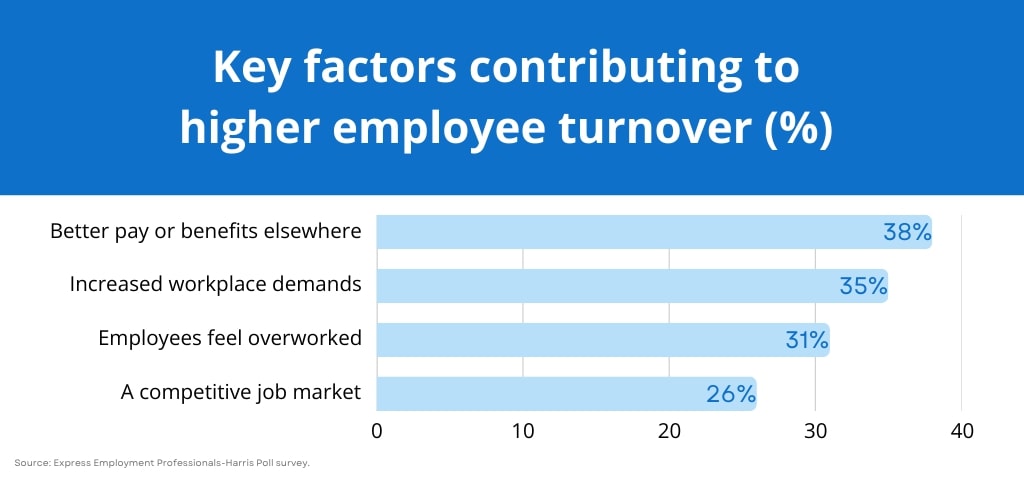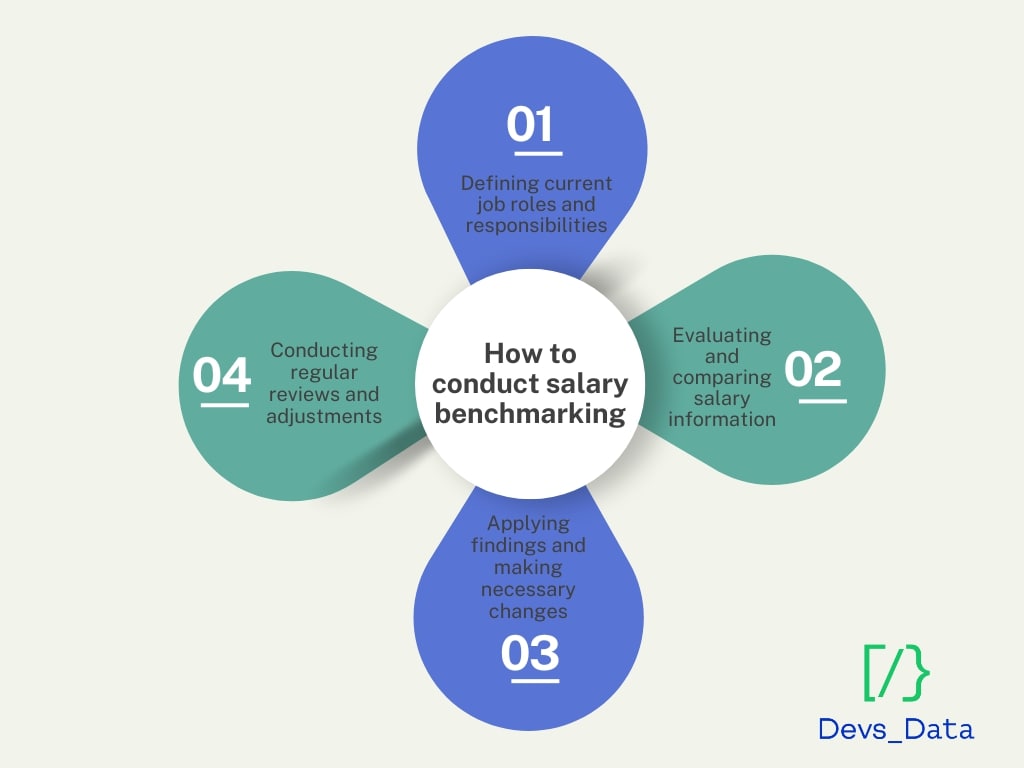


Attracting top talent in today’s competitive job market is no easy feat. With many companies competing for the same skilled candidates, standing out becomes crucial. One of the biggest factors influencing a candidate’s decision to accept a job offer is compensation. In 2023, insufficient compensation was the top reason employees left their jobs, according to Gallup. This highlights the critical role that salary plays in employee retention and overall job satisfaction. Another survey in 2024 reveals that companies expecting higher turnover attribute it to several key factors:

That’s where salary benchmarking comes in. It helps companies determine what attractive compensation looks like by comparing their pay packages to industry standards. In this article, we’ll explore how salary benchmarking can help businesses make more informed pay decisions, and we’ll walk through the benefits it can bring to your organization. We’ll also cover the steps you can take to implement salary benchmarking effectively and make sure your pay packages are in line with the market.

In a competitive job market, organizations benefit from knowing how their pay compares to others in the same field.
“Salary benchmarking is more than matching industry averages. It is about understanding where your organization stands in the talent market and using that insight to attract, retain, and motivate top performers.”
This process includes analyzing market trends, job positions, experience levels, and regional factors to attract and retain skilled professionals while maintaining internal salary consistency.
Salary benchmarking can be carried out in different ways, ranging from in-house research using public and industry data to the use of specialized platforms that aggregate and analyze market compensation information.
This approach involves gathering salary data through surveys, market reports, and direct industry research. HR teams typically analyze information from job boards, competitor data, or networking. Manual benchmarking provides a more hands-on, customized approach, allowing businesses to focus on specific roles, regions, or industries. However, it is time-consuming and may suffer from data inconsistencies, as it relies on the availability and accuracy of external sources.
Automated benchmarking uses specialized software and tools to gather and analyze real-time salary data from various online platforms, databases, and proprietary industry sources. These tools can process large volumes of data quickly and accurately, providing up-to-date market insights.
“Automated approaches are more efficient and can scale easily as your company expands, offering dynamic insights into salary trends across multiple regions and industries.”
However, the initial investment in software and data access can be higher, and automated systems may sometimes lack the flexibility of manual approaches for niche or very specific roles.
Many businesses combine both methods, using manual research for role-specific insights and automated tools for speed and broader market trends.
By using salary benchmarking, companies can identify competitive pay levels for each role and region. Offering salaries that align with or exceed market standards makes the organization more attractive to skilled professionals. Fair, well-informed compensation reduces turnover, creating a stable workforce while lowering recruitment costs and minimizing operational disruptions.
Benchmarking aligns salaries with industry standards, preventing underpayment that drives talent away or overpayment that strains budgets. By analyzing market data, businesses can offer fair wages that attract top talent without overspending.
A structured benchmarking approach helps companies distribute pay equitably across roles, reducing disparities and fostering employee trust. When employees feel valued, morale and job satisfaction improve, enhancing overall workplace culture.
Salary benchmarking helps businesses manage hiring costs by showing what competitive pay looks like in specific roles and regions. This insight prevents overpaying for talent while ensuring offers remain attractive enough to secure qualified candidates. By aligning salaries with market data and factoring in regional variations and recruitment expenses, companies can allocate budgets more efficiently and plan for future hiring needs.

Before gathering salary data, start by reviewing the roles within your organization. Go beyond job titles and look closely at the actual responsibilities, required skills, scope of decision-making, and reporting lines. This step is essential because similar titles can mean very different things depending on the company.
Examine existing job descriptions and update them if needed to reflect current duties. Include information such as core tasks, required experience, technical or soft skills, and any management responsibilities. If formal job descriptions don’t exist, gather this information directly from team leads or through internal interviews.
Having clearly defined roles allows for accurate alignment with external benchmarks. It ensures that the positions you’re comparing are truly equivalent in scope and seniority, which is crucial for setting fair and competitive compensation. This foundation makes the rest of the benchmarking process more reliable and easier to interpret.
Once you’ve defined your internal roles, the next step is to collect and analyze external compensation data. Use a mix of sources such as labor department statistics, industry-specific surveys, company filings, and crowdsourced platforms like Glassdoor. This range of data helps account for regional differences, job complexity, and sector-specific trends.
After gathering the data, group it by job function, level of seniority, and location. Match each internal role with the closest external equivalent, focusing on the scope of responsibilities rather than just the title. This step ensures that comparisons are valid and meaningful.
With roles aligned, compare your company’s current salaries against the available benchmarks. Identify where your pay levels fall below, within, or above the range. If your compensation is below the market average, but immediate increases are not possible, consider strengthening other aspects of your offer. Flexible schedules or learning budgets can help balance out lower base pay in the short term.
The findings you collect at this stage should inform both short-term decisions and long-term planning. Keep your notes organized by role and region to make future reviews more efficient. As part of these reviews, consider recent market trends.
“Tech salaries rose by 2.2% in 2024 despite economic challenges, with professionals holding 3-5 years of experience seeing nearly a 6% increase. Monitoring shifts like these ensures your benchmarking remains accurate and aligned with candidate expectations.”
This kind of trend data can help you anticipate shifts in candidate expectations and stay prepared for future adjustments.
After reviewing the comparisons, you may decide to update your internal salary bands. Use benchmarking insights as one input, alongside factors such as business performance, budget constraints, and workforce priorities. Start with roles that show the largest discrepancies or where hiring has been most difficult. If full adjustments aren’t feasible right away, create a phased plan that can be implemented over time.
When changes are made, explain them clearly to employees. Outline how external data was considered and what other factors influenced the decision. This kind of communication builds credibility and shows that pay decisions follow a structured and balanced approach. Even when no immediate changes are required, benchmarking can still support other areas, such as guiding promotion decisions, aligning new hire offers, planning budgets, and maintaining consistency across departments.
To keep compensation aligned with market shifts, review salaries on a set schedule. For most companies, this might mean once a year, but faster-growing teams or businesses operating in volatile markets may benefit from more frequent reviews.
Each cycle should include a fresh look at market data, internal pay levels, and any recent changes in job scope or company structure. If your company expands into new geographic areas or creates new roles, update your benchmarks accordingly.
Regular reviews support long-term consistency. They allow you to respond to evolving market conditions, correct pay disparities, and maintain a compensation structure that reflects both business goals and employee expectations.
While many companies choose to conduct salary benchmarking on their own, working with an experienced agency can improve accuracy and reduce the effort involved. These agencies often maintain well-organized databases, making it easier to assess current pay levels across job roles, sectors, and regions.
Specialized agencies collect and organize compensation data across a wide range of positions and industries. This allows for more accurate comparisons, particularly for roles that differ in structure across regions or require rare skill sets.
Agencies with experience in your field can help avoid common mistakes such as comparing roles that differ in scope or relying on outdated figures. Their familiarity with job functions and team structures makes their insights more practical and relevant.
Instead of spending weeks collecting and reviewing data, your internal team can concentrate on analyzing results and applying them to compensation decisions. The agency handles the time-consuming research, freeing your staff for higher-value tasks.
Hiring in more than one country often requires adjustments for regional pay levels, tax considerations, and cost of living. Agencies can help interpret these variables and provide context for setting fair and competitive salaries in each location.
Before deciding to engage an agency, consider the cost structure and the level of support offered. Some may charge a one-time fee, while others may work on a longer engagement. It is also important to check whether their recommendations align with your organization’s structure and compensation approach. Not all agencies offer the same level of detail or understanding of your sector.
Firms like DevsData LLC bring experience in both technical recruitment and compensation analysis, making them a strong choice when hiring across departments or entering new markets. Their support can help you understand not only what the market pays, but also what makes an offer competitive for the people you want to hire.
Do you have IT recruitment needs?
DevsData LLC, a leading IT recruitment agency with over 9 years of experience, excels in connecting businesses with top-tier tech talent and provides strategic support through salary benchmarking. By leveraging its in-depth industry knowledge and data-driven approach, DevsData LLC helps companies offer competitive compensation packages that align with market trends, ultimately attracting and retaining the right professionals for their tech teams.
With a 5/5 client satisfaction rating on Clutch and GoodFirms, DevsData LLC is recognized for providing high-quality recruitment services. The company’s recruitment process is detailed and effective, supported by a database of over 65000 pre-screened professionals and a dedicated team of 40 experienced recruiters based in the US and Europe.
Salary benchmarking is a core part of this offering. DevsData LLC has developed internal methods to evaluate compensation trends across regions, industries, and job roles. The team regularly reviews data from active recruitment projects, client hiring activity, and direct market research to advise on appropriate pay levels. This helps clients make informed decisions when adjusting salary structures or preparing job offers.
What distinguishes DevsData LLC is its combination of technical recruitment expertise and insight into compensation strategy. The team understands the value of specialized roles and how market dynamics affect hiring success. This dual perspective makes their salary benchmarking service both accurate and directly relevant to ongoing recruitment efforts.
DevsData LLC has partnered with prominent clients, including global corporations like Johnson & Johnson, ZIM, and BCG, along with forward-thinking startups from the US and Israel. With expertise across diverse industries, they specialize in cutting-edge technologies such as AI, machine learning, and data science. Their recruitment solutions are tailored to help businesses swiftly assemble strong, skilled teams, minimizing time-to-hire while ensuring each candidate is the ideal fit for the role.
DevsData LLC provides salary benchmarking as a standalone service or as part of a full recruitment engagement. Options include:
Each service is designed to support clear decision-making and practical implementation. Clients receive specific recommendations that align with both market expectations and internal goals.
Moreover, DevsData LLC provides Employer of Record (EoR) services, allowing companies to hire and manage remote teams globally while complying with local employment laws and regulations. This service offers a streamlined and compliant solution for businesses aiming to expand without the challenges of handling local HR processes.
Do you have IT recruitment needs?
To learn more about how DevsData LLC can assist with salary benchmarking and recruitment needs, contact them at general@devsdata.com or visit their website at www.devsdata.com.
Salary benchmarking is a vital tool for companies looking to stay competitive and attract top talent in today’s dynamic job market. By offering competitive compensation packages, businesses enhance their ability to recruit skilled professionals and promote long-term employee retention and job satisfaction. Conducting regular benchmarking allows companies to align their pay structures with market standards, maintain internal fairness, and avoid the risks of underpaying or overpaying employees.
Implementing a well-structured benchmarking process provides valuable insights that support informed decisions and better budget planning. Partnering with an experienced recruitment agency like DevsData LLC can make this process more effective. With access to up-to-date market data and industry-specific guidance, DevsData LLC is a strong partner for companies aiming to improve their salary benchmarking efforts. Backed by over 9 years of experience and a global network of more than 65000 candidates, they offer detailed insight into pay trends across technical roles and regions.
In addition to benchmarking, DevsData LLC provides Employer of Record and business process outsourcing (BPO) services, supporting companies that need to align salary data with international hiring needs. These services simplify global team management and help apply benchmarking insights in a compliant, scalable way. To learn more about DevsData LLC, watch the video below.
Frequently asked questions (FAQ)
DevsData – your premium technology partner
DevsData is a boutique tech recruitment and software agency. Develop your software project with veteran engineers or scale up an in-house tech team of developers with relevant industry experience.
Free consultation with a software expert
🎧 Schedule a meeting
FEATURED IN


DevsData LLC is truly exceptional – their backend developers are some of the best I’ve ever worked with.”
Nicholas Johnson
Mentor at YC, serial entrepreneur


 Build your project with our veteran developers
Build your project with our veteran developers
 Explore the benefits of technology recruitment and tailor-made software
Explore the benefits of technology recruitment and tailor-made software
 Learn how to source skilled and experienced software developers
Learn how to source skilled and experienced software developers




Categories: Big data, data analytics | Software and technology | IT recruitment blog | IT in Poland | Content hub (blog)
